I’m not really sure what to say about the month of May. I haven’t been training very well, I haven’t really performed in most events, kermesses and NAT interclub races (best result has been 20th in a 1.12A kermesse, one of only two races I’ve finished this month), and on the whole I haven’t particularly enjoyed riding my bike all that much.
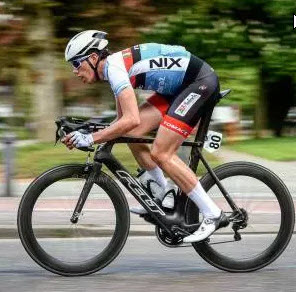
The more I’ve been into cycling seriously, the more I’ve come to realise it’s not so much a physical sport but a mental one.
Sure, it’s highly demanding physically, perhaps more so than any other sport in the world. You have to flog yourself in all conditions for hours upon hours each day, even when you’re exhausted, and then on top of that you’re only ever one pedal stroke away from sustaining anything from painful road rash which you have to continue riding with, or a career ending injury, or worse.
It’s part of the reason why the sport appealed to me in contrast to my studies at university. Having felt like I’d fulfilled what I’d hoped to achieve academically, I wanted a new challenge doing something I wasn’t necessarily obviously naturally talented at, or that wouldn’t be easy.
In other words, I wanted to try and excel myself and push towards an elite level in two completely different walks of life.
But really, without trying to be dramatic about it, the true battlefield within sport is in your mind. So much of your performance as a cyclist comes from your motivation, mental wellbeing, confidence, expectations and determination to succeed.
I think it’s this aspect of performance, often overlooked, more than anything else which defines ‘form’, feeling good in races and being able to train with quality and productivity. You can look at your fitness/fatigue chart on your training software all you want, but that’s only half the story and having a T.S.B. of +10 doesn’t guarantee you’ll be going well out on the road.
Great – so you just have to want to be good at cycling a lot more than anyone else and also enjoy riding your bike a lot… right?
Well, yes, if you’re a robot. It’s easy to say that you just have to “man up” and suffer more. But for everyone else who is human, there’s a complicated interplay between a whole host of factors that define how you’re feeling, on any given day in the short term and any given month or year in the long term.
Trying to control these factors to yield a beneficial result is something I’m yet to master, with periods of form and lack thereof seemingly developing at random and both potentiating themselves in vicious circles but in opposite directions. I’d say I’m very strong mentally with regards to motivation, drive and self-reflection, but that strength exerts itself both ways and can either lead to exceptionally good or poor performances.
There’s not much that I tend to do half-heartedly in life because I’m a bit obsessive about things. With regards to training, this means spending a lot of time off the bike pouring unnecessarily over Training Peaks like a right bore, looking at all my numbers and worrying that I should be doing something differently or that I’m not good enough in some way.
Being so self-critical and hard on myself perhaps leads to feeling like I’m not going well more often than not. It’s also surely a big mental strain, and I’d be less likely to experience ‘burn out’ like symptoms if I learnt to switch off and do other non-cycling things a bit better. All part of learning to be a full time athlete, I guess.
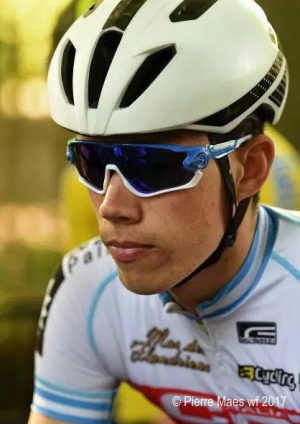
From my studies (bear with me here), I know that the autonomic nervous system (the subconscious regulatory sibling of the somatic nervous system, which we use to consciously control our muscles) can deliver an incredibly powerful influence on our body in response to levels of motivation, desire and fatigue.
In my opinion, the concept of ‘overtraining’ is just a natural protection system jumping into action, whereby when you’ve pushed your body physically and stressed yourself mentally to a sufficient extent, your brain flicks a switch and essentially puts a block (via the autonomic nervous system) on the signals being sent to your muscles (via the somatic nervous system), to prevent further stress.
So in the moment, you may want to push the pedals hard as much as you want, but in the background that’s being prevented by your brain limiting what you can do in response to your mental state.
Many riders seem to ‘burn out’ towards the end of the season or struggle to hold ‘form’. That’s commonly attributed to having a season’s worth of racing fatigue in the legs, but could it not be more to do with the fact that it’s difficult to stay really motivated and driven for month after month?
That’s exactly why riders generally have a few weeks off the bike around October time – the “offseason”. It’s not really because they need a physical break, but more a mental one, a holiday from the mental stress of training and racing. That way, they start the yearly cycle again hungry and motivated to progress.
With regards to this month then and with the above, *ahem*, in mind, I’ve been left wondering whether it’s all just in my head, especially as on paper I know that I should be going really well right now.
Am I struggling in training and racing because there’s something physically wrong with the condition of my body (fatigue, illness, health problem, dietary deficiency or otherwise), or has a switch just been flicked upstairs for the moment?
It’s interesting to note how sometimes I’ll be towards the back suffering, and yet if I make a concerted effort to move up to the front and get involved, suddenly I’m feeling comparatively strong. This is something which has become apparent this year far more than ever before, maybe because I am now riding full time so it has my full attention and there is pressure to perform, whereas previously it’s been an escape from studying more than anything.
Maybe it’s because I gave so much to my winter training that when I started racing and it didn’t go as well as expected, I struggled to push through it. I’d had the perfect winter’s training, so to suddenly encounter problems was difficult to deal with.
Add to that being victim to some severe team management issues which represented an equally severe mental blow and being in a foreign country with things not going to plan, and I was left a bit lost and disappointed.
Things will never go exactly to plan, and that’s something that I need to learn to deal with better and adapt to. Having said that, I’ve never experienced start of season hiccups of this nature before, so it’s perhaps unsurprising that they’ve had this effect.
Many people will read this (that’s assuming anyone has actually made it this far down) and see it as a moaning depressive list of excuses, but for me it’s a case of evaluating why things aren’t going well and establishing how to move forwards.
I hope it also gives some insight into what’s goes on behind closed doors when, for example, a British rider racing abroad tweets briefly about how they did not finish a race, or about how they’re struggling to find their legs at the moment.
I hope you value my honesty and find it as interesting as it was helpful for me to write.
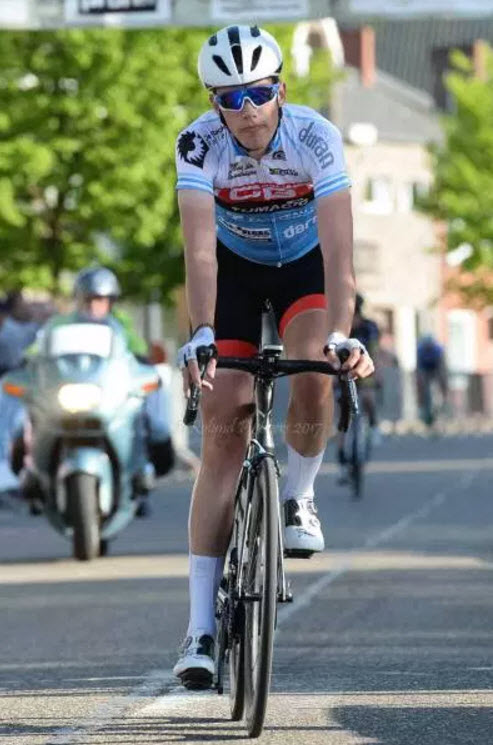
So, after getting the moaning depressive list of excuses seen above out of the way, you may now be wondering after all that, what next? What’s the plan moving forward?
Well, as the blog post title suggests, I’ve gone back to the proverbial drawing board and decided to reset and pursue a different path for the rest of the season.
For a start, I lost my patience with the management issues and left Belgium. I don’t think it’s right to comment much further, but essentially there was one broken promise and let-down too many and it was time for me to move on.
Whilst I have the ability to do reasonably well racing in Belgium, my gut feeling is that the style of racing doesn’t quite suit me as well as it needs to do in order to really excel there.
It demands a fair bit of a fast twitch jump and despite working hard on this over the winter and seeing improvements, I’m still mainly a diesel engine type of rider with predominantly slow twitch muscle fibres.
Whilst I could have continued riding kermesses alone in Belgium, I decided it was better to return home and reassess, and sadly my outlook on Belgium had also been somewhat tarnished by the issues I’d encountered.
What I came to realise was that I’d always done reasonably well on hilly terrain despite carrying around several kilograms of excess weight. I’d never really tried hard to see how light I could get myself, and I’d always wondered whether maybe I was just a slightly overweight semi-climber rather than an pure northern classics style rider.
Certainly, it wouldn’t harm to become more well rounded and versatile. It soon became clear that if I lost a little bit whilst maintaining power, I had the potential to be right up there on hard courses.
The problem was, however, that I’d spent much of the winter in the gym trying to build sprint power and muscle mass for racing in the flatlands of Belgium, and had given little concern to my body fat percentage. As a result I was several kilograms heavier than I’d ever been racing at before.
As I write this, I have already got myself about 3-4kg lighter in little over 3 weeks, and I intend on losing approximately 3kg more in the next few weeks in order to get to a competitive power-to-weight ratio. It’s quite a transformation, but hopefully it will pay off for me.
I plan to put this into action at the Beaumont Trophy (UCI 1.2) on 18th June (my first ever UCI race), and then the remaining races in the U.K. National Grand Prix Series (formerly the ‘Premier Calendar’) – the Tour of the Reservoir, Stockton Velo29-Altura Grand Prix and the Ryedale Grand Prix.
I’m extremely fortunate and grateful to have been offered the support of the TBW Bottecchia Wigmore RT U23 for these U.K. races, a team local to me in Kent.
The aim is simple: get up there and try and achieve at least one stand out result. Additionally, I should hopefully have the opportunity to guest ride for an elite amateur team in Italy for a few weeks in August.
I’m actually lucky enough to be in Italy right now based at the team house, doing a two week solo training camp to prepare for the rest of the season and the new goals outlined above. I can’t thank the Lewis Balyckyi Trust Fund enough for continuing to support me and enabling me to get this important training block in the legs and then race at the top level across Britain.
Having reset and refocussed on very different challenges ahead, I feel relieved to be back training and motivated to press on and see what I can achieve.
Finally there’s nothing getting in the way between me and performing in races. I’m already back producing some great power numbers so I’m excited for the coming few months. When the going gets tough, the tough get going…
Thanks for reading and congratulations for making it to the end! That seemed to turn out more like a therapeutic diary entry than a blog post, but hopefully you found it interesting (and maybe even helpful if you also cycle).
Belgium race reports & photos below…
Sinaai 1.12A kermesse (8th May, 123km)
A fast flowing course which suited me well, and the legs seemed to feel pretty good. Unfortunately, however, I punctured on the cobbled section of the second lap so that was my race over.
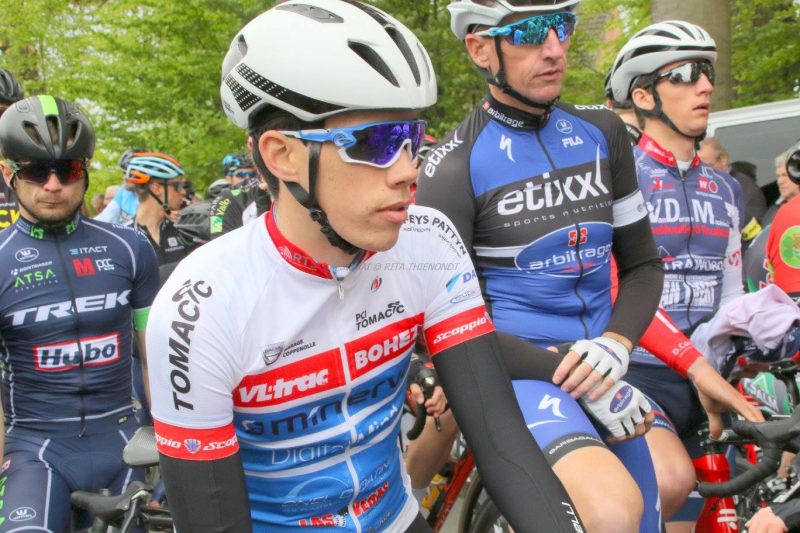
Hooglede 1.12B kermesse (9th May, 112km)
I’d ridden this race last year on a weekend trip to Belgium (I placed 19th from a small breakaway group), and knew just how hard the course was and how quickly the race would split to bits with large time gaps by the finish.
The combination of three short drags and exposed crosswind sections means the strongest riders are soon up the road.
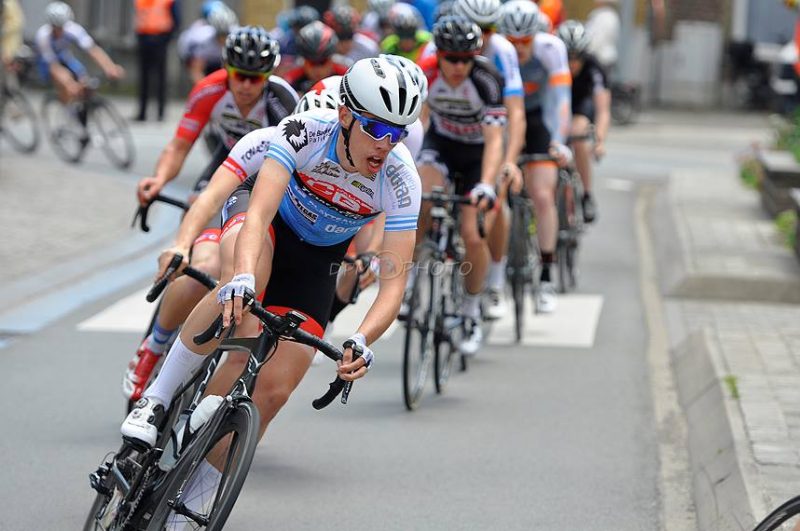
This year, despite feeling reasonably good at the start and active towards the front, I just didn’t seem to quite have the legs to make the splits and found myself in the last group on the road after an hour finding it tough going.
A disappointing result in a race I was looking forward to performing well in.
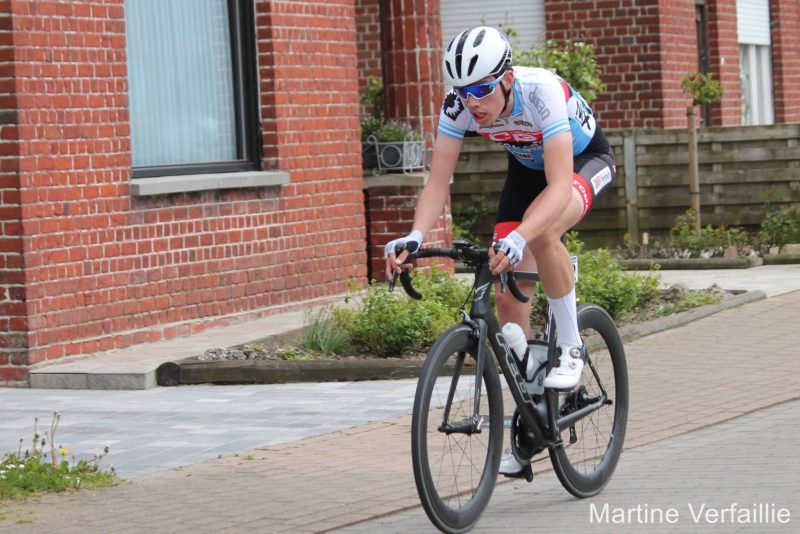
Beveren-Waas 1.12B kermesse (10th May, 111km)
Another very fast flowing course and large field yielded an average race speed of 46.2kph. I was towards the back for the first half of the race struggling to get my legs going a bit, though this was of little disadvantage on this course.
After 80 minutes, I could see a very promising move developing, and so immediately I got myself off the front and set about trying to bridge the small gap with some help from a couple of other riders.
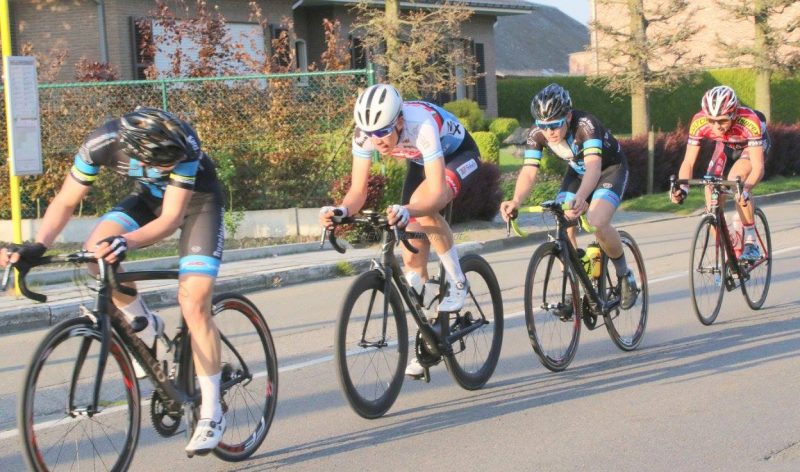
The next 5 minutes were full gas, averaging 50kph in the gap and very nearly making the junction. I couldn’t quite make it across as the breakaway got organised and the riders I was with began to suffer.
The group almost stayed away until the end, but was caught in the closing kilometres, and I rolled in amongst the very sketchy bunch sprint, managing to avoid the various crashes and near misses.
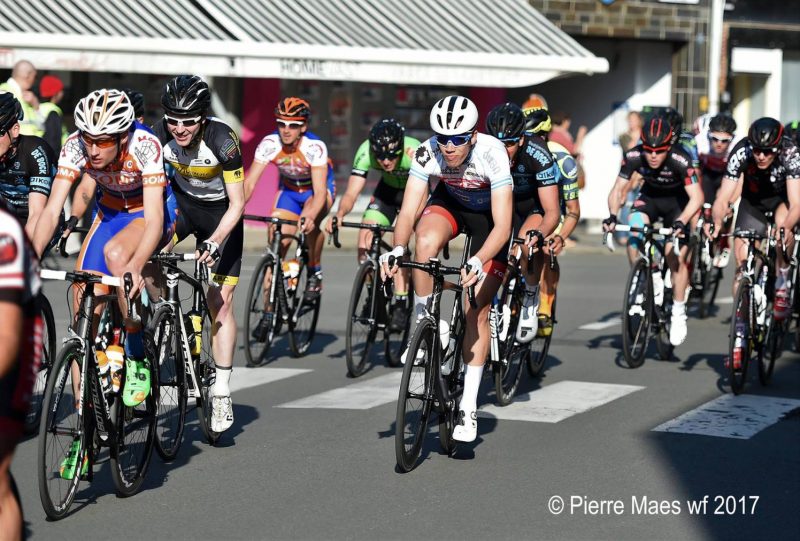
Belsele-Puivelde 1.12B kermesse (13th May, 120km)
This course would have been interesting enough in the dry, with two cobbled sections and two turns from big roads onto small muddy lanes which both required the bunch to hop a curb at a very shallow angle.
In this case, however, the heavens opened 30 minutes before the start, turning the lanes into mud baths and flooding parts of the course. Not only did my legs feel terrible (yes, again, it’s a recurring theme this month), but moreover if I am honest I felt completely out of my comfort zone in the conditions, which quickly put me out the back of the race.
Perhaps this was due in part to not having to ride almost at all in wet conditions over the winter or since my collarbone break, but historically I have always done quite well and felt confident in the wet when racing in the U.K., so I’m hoping this will return.
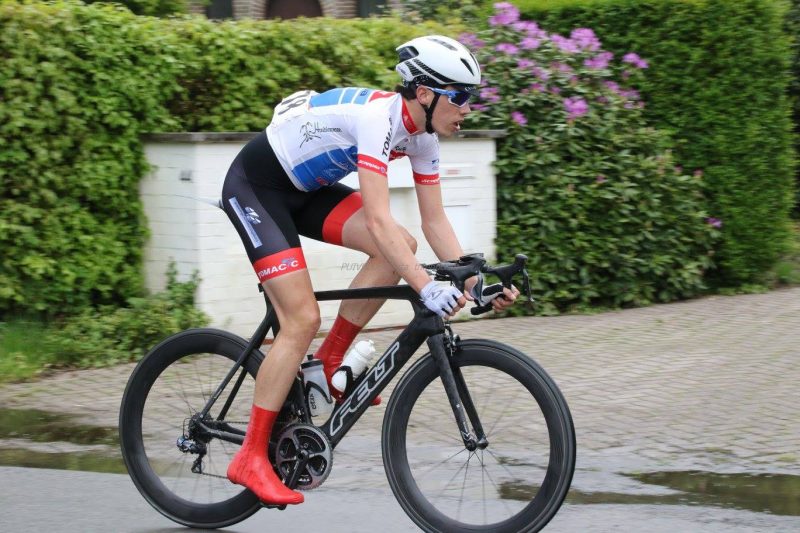
Hamont-Achel 1.12A kermesse (14th May, 121km)
Arguably the absolutely perfect course for me with the need to brake for just one corner – a real drag strip with plenty of crosswinds.
For once, my legs felt brilliant which made for a nice change, and I was active at the front throughout the opening laps. After 25 minutes, I could see the winning move going, but I was boxed in a couple of rows back so it took me a few seconds to chip off the front, by which time there was 5-10 second gap to bridge.
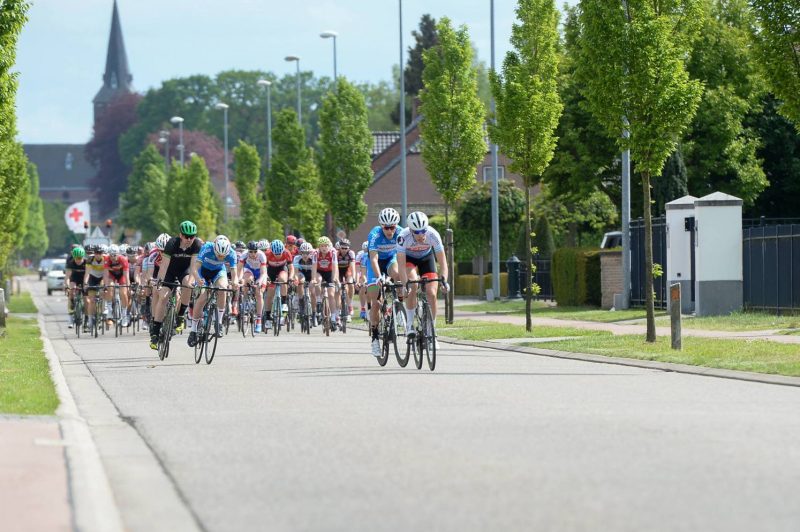
I found myself with two other riders, only one of which took turns, and together we had almost closed the gap to the breakaway, which was beginning to get organised and pull hard.
As they tired, I pushed on alone and got to within an agonising 20 metres of the back of the break, and just couldn’t finish it off. I dangled there for a while, desperately trying to make it across, before running out of steam and returning to the peloton.
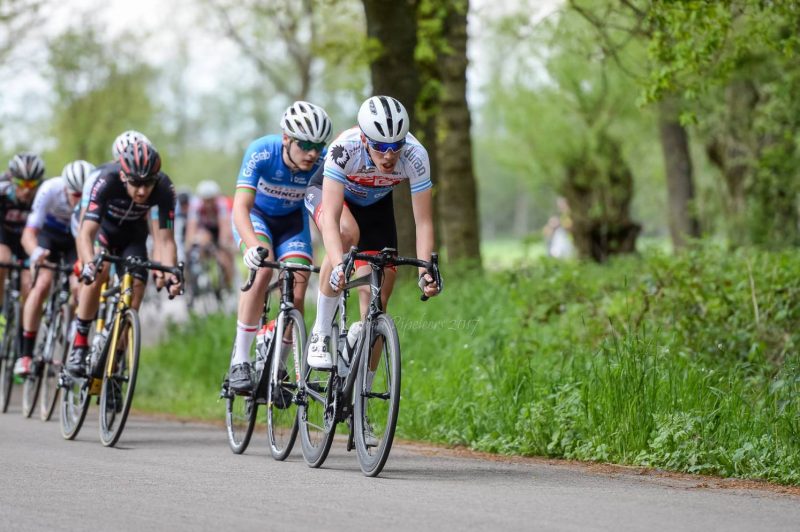
After a lot of easy rolling around at the back monitoring the situation (save for one lap of chasing back on after my chain dropped), I found myself solo off the front of the peloton after riding away in a series of attacks.
Into time trial mode, and I pressed on with a healthy gap for the last 30 minutes of the race.
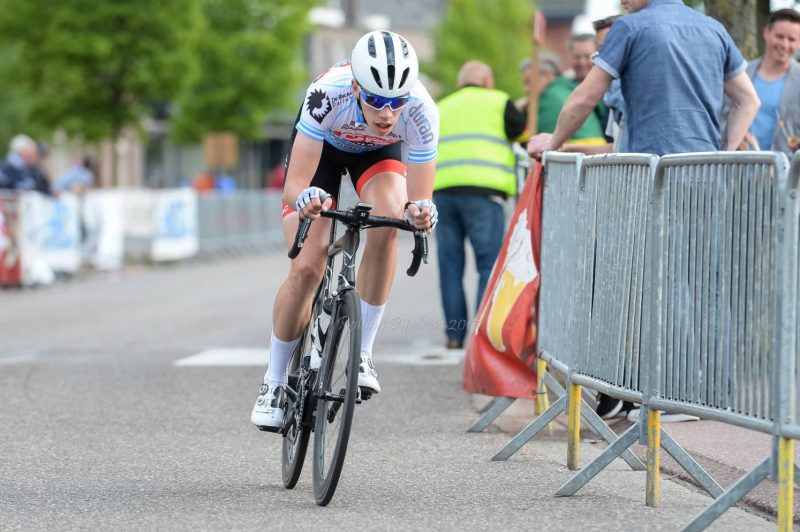
Despite sitting up to wait for a small group of five riders to join me, I was able to attack and comfortably ride away from them to finish best of the rest behind the breakaway, in 20th place.
A good performance, but I can’t help but think what would have been if I had made the front group . . .
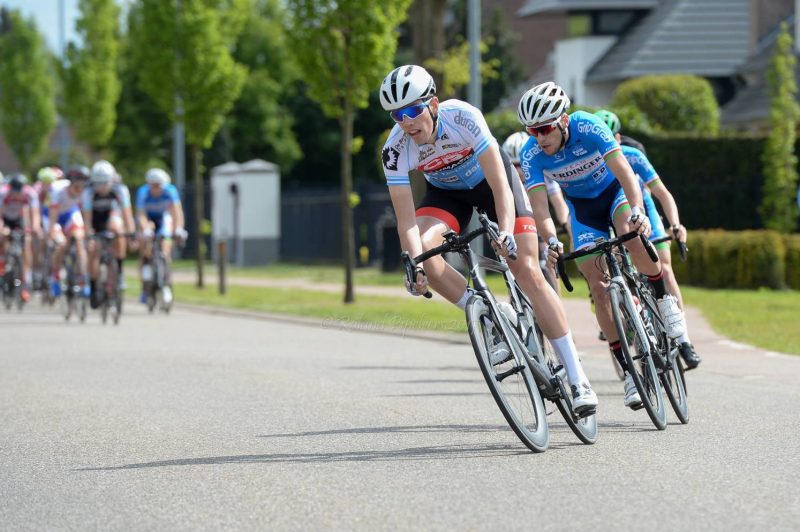
Lommel 1.12A kermesse (16th May, 123km)
In complete contrast to the race two days previously, this kermesse course was very technical with a total of eight corners over just 5.4km.
Most of these were tiled with speed ramps on the entry and exit, something which I struggle with in particular but am trying to improve on.
In a nutshell, my cornering on the day wasn’t really up to scratch, and slipping backwards quickly meant, as is often the case in Belgian kermesses, you had to do an insane amount of sprinting out of every corner to hang on. Getting dropped soon followed.
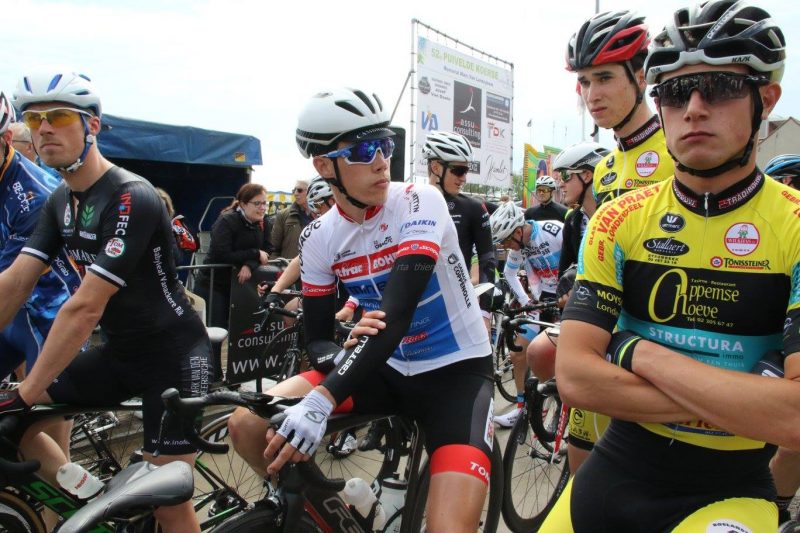
21st G.P. Etienne de Wilde, Laarne, 1.12 IC 1 NAT interclub (28th May, 160km)
I went to this race on my way to the Dunkirk ferry home, after almost two weeks of feeling pretty dreadful in training and taking a few days off the bike entirely.
The course suited me well, but my legs once again just felt awful and I struggled to push any kind of meaningful power out, especially in the extremely hot conditions.
Even when a large group went up the road and the pace behind eased, I couldn’t hang on. Looking at my power data afterwards, the numbers were along the lines of what I would typically produce on a long endurance training ride, so I was clearly on a particularly bad day.
It’s so frustrating to not be performing when I know I should be given the work put in during the winter months, and to know that on a good day, I could have done really well in a race like this.



